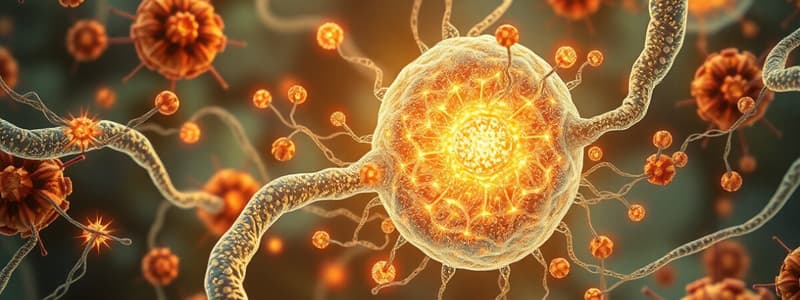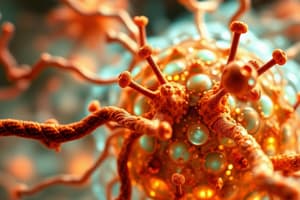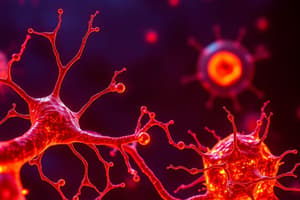Podcast
Questions and Answers
What type of signaling involves a cell responding to its own secreted signaling molecule?
What type of signaling involves a cell responding to its own secreted signaling molecule?
- Endocrine signaling
- Paracrine signaling
- Juxtacrine signaling
- Autocrine signaling (correct)
Which type of receptor is primarily involved in the action of steroid hormones?
Which type of receptor is primarily involved in the action of steroid hormones?
- Receptor protein-tyrosine kinases (RTKs)
- G-protein coupled receptors (GPCRs)
- Nuclear hormone receptors (correct)
- Ligand gated channels
Which process describes a signaling molecule's effect on distant target cells through the circulatory system?
Which process describes a signaling molecule's effect on distant target cells through the circulatory system?
- Endocrine signaling (correct)
- Local signaling
- Paracrine signaling
- Intracrine signaling
In the absence of thyroid hormone, the thyroid hormone receptor associates with which type of proteins?
In the absence of thyroid hormone, the thyroid hormone receptor associates with which type of proteins?
What is the primary role of coactivators in glucocorticoid action?
What is the primary role of coactivators in glucocorticoid action?
What role do kinases play in signal transduction pathways?
What role do kinases play in signal transduction pathways?
How can phosphorylation affect proteins in different ways?
How can phosphorylation affect proteins in different ways?
What is a characteristic feature of signaling pathways according to the content?
What is a characteristic feature of signaling pathways according to the content?
Which of the following is NOT a result of protein phosphorylation?
Which of the following is NOT a result of protein phosphorylation?
Among the common elements of cell signaling systems, which type of proteins is frequently mentioned in relation to signaling pathways?
Among the common elements of cell signaling systems, which type of proteins is frequently mentioned in relation to signaling pathways?
Which type of receptor is responsible for the majority of cell-surface receptor interactions?
Which type of receptor is responsible for the majority of cell-surface receptor interactions?
What molecule is synthesized by adenylyl cyclase when activated by a G protein?
What molecule is synthesized by adenylyl cyclase when activated by a G protein?
What is the role of protein kinase A (PKA) when activated by cAMP?
What is the role of protein kinase A (PKA) when activated by cAMP?
Which component of protein kinase A remains inactive until cAMP binds to it?
Which component of protein kinase A remains inactive until cAMP binds to it?
What occurs as a result of epinephrine binding to a GPC receptor?
What occurs as a result of epinephrine binding to a GPC receptor?
What does cAMP induce in terms of gene expression?
What does cAMP induce in terms of gene expression?
Which of the following statements regarding G proteins is accurate?
Which of the following statements regarding G proteins is accurate?
In the context of GPCR signaling, what function does cAMP serve?
In the context of GPCR signaling, what function does cAMP serve?
What is primarily released into the bloodstream as a response to epinephrine during the fight or flight reaction?
What is primarily released into the bloodstream as a response to epinephrine during the fight or flight reaction?
Which of the following structures is a distinct subfamily of GPCRs involved in olfactory senses?
Which of the following structures is a distinct subfamily of GPCRs involved in olfactory senses?
Flashcards
Cell Signaling
Cell Signaling
Cells respond to external stimuli by activating specific signaling pathways.
Types of Cell Signaling
Types of Cell Signaling
Signaling molecules can be classified based on the distance they travel: Endocrine (long distance, hormones in bloodstream), Paracrine (short distance, local effects), Autocrine (self-signaling).
Importance of Cell Signaling
Importance of Cell Signaling
Cell signaling is crucial for regulating cell growth and division, affecting virtually every aspect of cell structure and function.
Receptor Specificity
Receptor Specificity
Signup and view all the flashcards
Steroid Hormone Receptors
Steroid Hormone Receptors
Signup and view all the flashcards
Nuclear Receptor Superfamily
Nuclear Receptor Superfamily
Signup and view all the flashcards
Steroid Signaling
Steroid Signaling
Signup and view all the flashcards
Kinases
Kinases
Signup and view all the flashcards
Phosphatases
Phosphatases
Signup and view all the flashcards
GTP-binding Proteins
GTP-binding Proteins
Signup and view all the flashcards
G Protein-Coupled Receptors (GPCRs)
G Protein-Coupled Receptors (GPCRs)
Signup and view all the flashcards
G Protein Signaling Pathway
G Protein Signaling Pathway
Signup and view all the flashcards
G Proteins
G Proteins
Signup and view all the flashcards
Cyclic AMP (cAMP)
Cyclic AMP (cAMP)
Signup and view all the flashcards
Adenylyl cyclase
Adenylyl cyclase
Signup and view all the flashcards
Protein Kinase A (PKA)
Protein Kinase A (PKA)
Signup and view all the flashcards
Ligand
Ligand
Signup and view all the flashcards
Signal Amplification
Signal Amplification
Signup and view all the flashcards
Signal Transduction
Signal Transduction
Signup and view all the flashcards
Study Notes
Cell Signaling Overview
- Cells must respond adequately to external stimuli for survival.
- Cell signaling regulates cell growth and division.
- Cell signaling impacts every aspect of cell structure and function.
- Signal molecules either enter cells or bind to cell-surface receptors.
Types of Cell Signaling
- Direct cell-cell contacts: Cells communicate directly through cell junctions or membrane-bound molecules.
- Endocrine signaling: Hormones travel through the circulatory system to act on distant target cells.
- Paracrine signaling: Molecules act locally on nearby target cells.
- Autocrine signaling: Cells produce and respond to their own signal molecules.
Signal Transduction Pathways
- Contact-dependent signaling: Signaling molecules are membrane-bound.
- Paracrine: Signaling molecules act locally.
- Synaptic signaling: Neurotransmitters are released from a neuron to act on a nearby target cell across the synapse.
- Endocrine signaling: Hormones travel through the circulatory system to act on distant target cells.
Types of Receptors
- Cell-surface receptors: Hydrophilic signal molecules bind to receptors on the cell surface.
- Intracellular receptors: Small, hydrophobic signal molecules cross the plasma membrane to bind to intracellular receptors.
- Receptors may include steroid hormone receptors, G-protein coupled receptors (GPCRs), receptor protein tyrosine kinases (RTKs), ligand-gated channels, and specific receptors like B- and T-cell receptors.
Receptor Tyrosine Kinases (RTKs)
- Growth factor binding induces receptor dimerization.
- Dimerization results in receptor autophosphorylation.
- Phosphotyrosine-binding domains of downstream signaling molecules attach to the activated receptor.
Non-receptor Tyrosine Kinases
- Cytokinin binding enables receptor dimerization.
- The associated nonreceptor tyrosine kinases are activated via phosphorylation.
- Tyrosine residues are phosphorylated on target receptors producing phosphotyrosine-binding sites for downstream signaling molecules.
JAK/STAT Pathway
- STAT proteins are transcription factors with SH2 domains.
- Inactive STAT proteins are found within the cytosol.
- Cytokine activation leads to STAT protein binding to the receptor followed by phosphorylation via JAKs.
- Phosphorylated STAT proteins dimerize then translocate to the nucleus and activate gene transcription.
Integrin Signaling
- Integrins link cells to the extracellular matrix (ECM).
- Integrins act as receptors that initiate signaling pathways.
- Integrin binding to ECM activates non-receptor tyrosine kinase FAK via autophosphorylation.
- Src phosphorylates additional FAK tyrosine residues creating new binding sites for downstream signaling molecules.
General Properties of Pathways
- Signaling pathways are branched and interconnected.
- Pathways produce second messengers which are small molecules that activate or inactivate specific proteins.
Studying That Suits You
Use AI to generate personalized quizzes and flashcards to suit your learning preferences.




